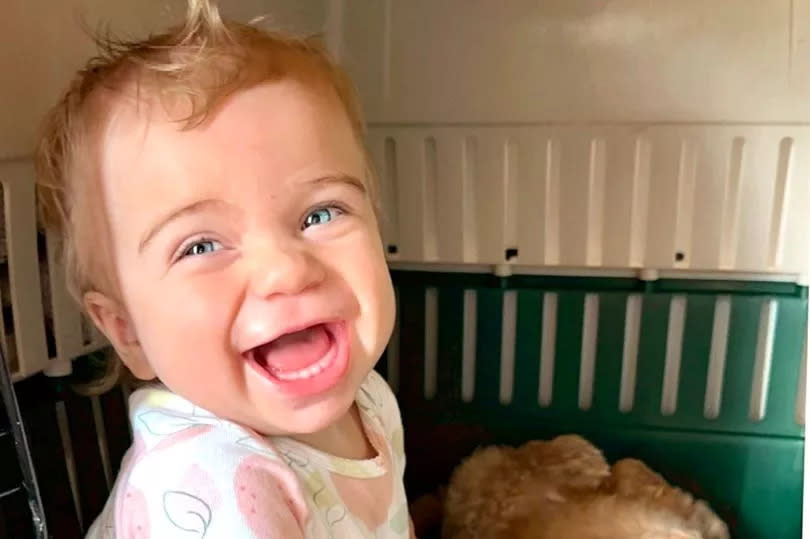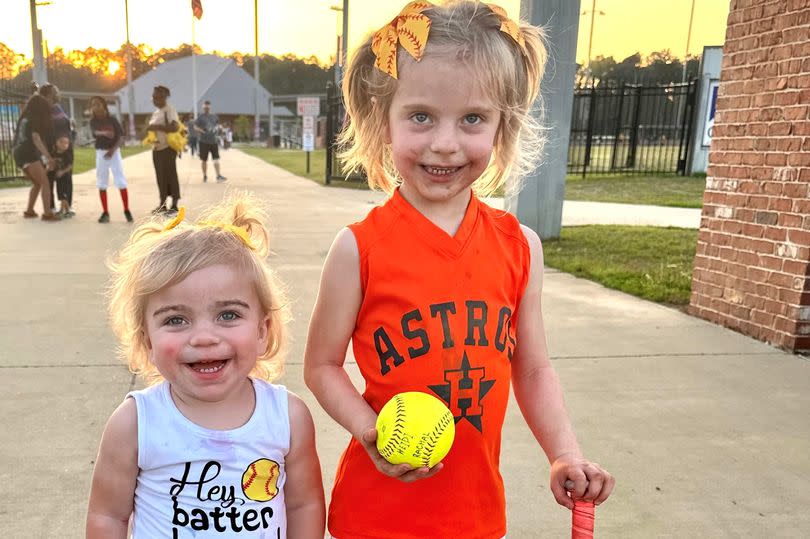Baby diagnosed with 'childhood Alzheimer's' after mum finds 'twin' on TikTok

A mother has shared her heartbreak after her "perfect" baby was diagnosed with a rare condition, which is often referred to as 'childhood Alzheimer's'. Morgan Rachal, 29, was ecstatic when she gave birth to her second daughter, Lydia, who is now 20 months old.
Morgan Rachal, 29, and her husband Kirk, 34, welcomed Lydia in October 2022. The couple, who also share five year old Heidi, had no initial concerns about their newborn daughter.
Believing her daughter to be in good health, aside from minor issues like ear infections, constipation, and sleep disturbances, the diagnosis came as a shock. The turning point came when Morgan's mum came across a TikTok video of a little girl who could have been Lydia's "twin".
The little girl looked identical to Lydia and showed similar features and symptoms. Morgan found out the girl had a rare disorder called Sanfilippo, which what Lydia eventually was diagnosed with, reports the Daily Record.
Children affected by Sanfilippo syndrome often have distinctive facial features such as full lips, thick eyebrows that meet in the middle, or hirsutism, which is excessive hair growth. After showing the video to her doctor, Lydia underwent tests and was diagnosed with Sanfilippo syndrome type B, which cruelly leads to a regression of developmental milestones

Currently, Lydia shows no cognitive decline, but without treatment, her condition is expected to deteriorate. Morgan, a nurse from Natchitoches, Louisiana, is hopeful about getting Lydia into a clinical trial, as there is no cure for Sanfilippo at present.
Signs and symptoms of Sanfillipo Syndrome, according to Boston Children's Hospital, include:
delayed speech
behavior problems
certain features of autism spectrum disorder (difficulty with communication and social skills)
sleep disturbances
developmental regression
intellectual disability
seizures
movement disorders
mildly coarse facial features
an enlarged head (macrocephaly) and/or tongue (macroglossia)
umbilical/inguinal hernia
Over time, symptoms children might have include arthritis, hearing loss, visual impairment, enlargement of the liver and spleen, frequent respiratory infections and chronic diarrhea.
Reflecting on the moment of diagnosis, Morgan said: "The doctor said the words 'she's perfect' when she was born. She was hitting all her milestones. My mum came across a TikTok in March called the saving Liv TikTok. They looked like twins.
"My mum said she looks just like Lydia. I started looking more into the syndrome. It was the worst day ever [when Lydia was diagnosed]. It's very heart breaking."
Morgan added: "She had frequent ear infections. She was constipated. She never slept through the night. It was all common things that babies have. I wasn't looking at anything wrong. I was never worried about anything."
However, everything changed when Morgan's mother came across a TikTok video of a little girl with Sanfilippo Syndrome who bore a striking resemblance to Lydia, particularly the thick eyebrows which are characteristic of the condition. After showing the video to their paediatrician, who noted the similarities, Lydia was referred for further testing.
Following blood and urine tests, the family received the devastating confirmation a week later. Morgan shared: "When I found out I was in a really dark place."
Further analysis revealed Lydia had type B Sanfilippo, caused by a defect in the NAGLU gene. Morgan explained: "They don't start to regress until aged three or four. She knows about 20 words. She's the happiest baby."
With time of the essence, Morgan is now focused on getting Lydia enrolled in a clinical trial, hoping to find a treatment that could alter the course of the disease.
She said: "They call it childhood dementia. She won't be able to walk, or talk. She won't make it through the third decade of life. Her joy right now will be taken away if she doesn't get into treatment."
Morgan expressed her deep gratitude that her mum came across the TikTok video, which led to an early diagnosis for Lydia before any regression could occur. The mother of two is now on a mission to raise awareness about the symptoms so that other children can be diagnosed early and to support research into finding a cure.
She said: "She is a little ray of sunshine. She blows kisses. She is a little bundle of joy. She's a normal baby."
Donate to help Morgan raise money to help fund a clinical trial here.

 Yahoo News
Yahoo News 
